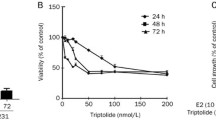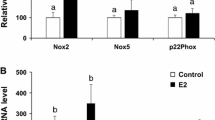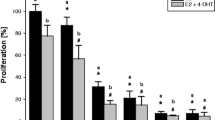Abstract
There is increasing evidence that induction of apoptosis by antihormones is an important mechanism in regard to their growth inhibitory action on hormone dependent tumors. In this report we have compared the efficiency of tamoxifen (Tam) and the pure antiestrogen ICI 182780 (ZM) to induce apoptosis in the estrogen dependent breast cancer cell line MCF‐7. Clear evidence for induction of apoptosis could be demonstrated after treatment with both antiestrogens. Application of the pure antiestrogen ZM led to a significantly higher induction of apoptosis compared to the partial agonistic compound Tam. The ability of the two compounds to induce apoptosis correlated with their growth inhibitory action. On the molecular level administration of ZM led to a time dependent steady decrease of BCL‐2 mRNA and protein. Administration of Tam also initially decreased the expression of BCL‐2. In contrast to ZM treatment, BCL‐2 expression increased again after 8 h of incubation with Tam. After 96 h Tam treated cells expressed BCL‐2 levels nearly as high as untreated cells. In general, ZM decreased BCL‐2 levels more effectively than Tam. Our results demonstrate that ZM and Tam possess quantitative and qualitative differences in their ability to down regulate BCL‐2 expression. The higher ability of the pure antiestrogen to down regulate BCL‐2 expression may explain the superiority of the pure antiestrogen to induce apoptosis and to inhibit the growth of MCF‐7 cells.
Similar content being viewed by others
References
Furr BJ, Jordan VC: The pharmacology and clinical uses of tamoxifen. Pharmacol Ther 25: 127–205, 1984
Jaiyesimi IA, Buzdar AU, Decker DA, Hortobagyi GN: Use of tamoxifen for breast cancer: twenty-eight years later. J Clin Oncol 13: 513–529, 1995
Morrow M, Jordan VC: Molecular mechanisms of resistance to tamoxifen therapy in breast cancer. Arch Surg 128: 1187–1191, 1993
Tonetti DA, Jordan VC: Possible mechanisms in the emergence of tamoxifenresistant breast cancer. Anticancer Drugs 6: 498–507, 1995
Jordan VC, Morrow M: Should clinicians be concerned about the carcinogenic potential of tamoxifen? Eur J Cancer 30A: 1714–1721, 1994
Assikis VJ, Neven P, Jordan VC, Vergote I: A realistic clinical perspective of tamoxifen and endometrial carcinogenesis. Eur J Cancer 32A: 1464–1476, 1996
Bilimoria MM, Assikis VJ, Jordan VC: Should adjuvant tamoxifen therapy be stopped at 5 Years? Cancer J Sci Am 2: 140–150, 1996
Wakeling AE: A new approach to breast cancer therapy - total estrogen ablation with pure antiestrogen. In: Jordan VC (ed) Long-Term Tamoxifen Treatment for Breast Cancer. Madison W, University of Wisconsin, 1994, pp 219–234
Osborne CK, Coronado-Heinsohn EB, Hilsenbeck SG, Mc-Cue BL, Wakeling AE, McClelland RA, Manning DL, Nicholson RI: Comparison of the effects of a pure steroidal antiestrogen with those of tamoxifen in a model of human breast cancer. J Natl Cancer Inst 87: 746–750, 1995
Gradishar WJ, Jordan VC: Clinical potential of new antiestrogens. J Clin Oncol 15: 840–852, 1997
Wakeling AE, Dukes M, Bowler J: A potent specific pure antiestrogen with clinical potential. Cancer Res 51: 3867–3873, 1991
Wilson JW, Wakeling AE, Morris ID, Hickman JA, Dive C: MCF-7 human mammary adenocarcinoma cell death in vitro in response to hormone-withdrawal and DNA damage. Int J Cancer 61: 502–508, 1995
Kerr JF, Wyllie AH, Currie AR: Apoptosis: a basic biological phenomenon with wide-ranging implications in tissue kinetics. Br J Cancer 26: 239–257, 1972
Hockenbery D, Nunez G, Milliman C, Schreiber RD, Korsmeyer SJ: BCL-2 is an inner mitochondrial membrane protein that blocks programmed cell death. Nature 348: 334–336, 1990
Garcia I, Martinou I, Tsujimoto Y, Martinou JC: Prevention of programmed cell death of sympathetic neurons by the bcl-2 proto-oncogene. Science 258: 302–304, 1992
Gee JM, Robertson JF, Ellis IO, Willsher P, McClelland RA, Hoyle HB, Kyme SR, Finlay P, Blamey RW, Nicholson RI: Immunocytochemical localization of BCL-2 protein in human breast cancers and its relationship to a series of prognostic markers and response to endocrine therapy. Int J Cancer 59: 619–628, 1994
Ceccarelli C, Santini D, Chieco P, Taffurelli M, Marrano D, Mancini AM: Multiple expression patterns of biopathological markers in primary invasive breast carcinoma: a useful tool for elucidating its biological behavior. Ann Oncol 6: 275–282, 1995
Wang TT, Phang JM: Effects of estrogen on apoptotic pathways in human breast cancer cell line MCF-7. Cancer Res 55: 2487–2489, 1995
Michna H, Schneider MR, Nishino Y, El Etreby MF: Antitumor activity of the antiprogestins ZK 98.299 and RU 38.486 in hormone dependent rat and mouse mammary tumors: mechanistic studies. Breast Cancer Res Treat 14: 275–288, 1989
Sambrook J, Fritsch EF, Maniatis T: Molecular Cloning - A Laboratory Manual, 2nd edition. Cold Spring Harbor Laboratory, Cold Spring Habor, 1989
Murphy LD, Herzog CE, Rudick JB, Fojo AT, Bates SE: Use of the polymerase chain reaction in the quantitation of mdr-1 gene expression. Biochemistry 29: 10351–10356, 1990
Knauthe R, Diel P, Hegele-Hartung C, Engelhaupt A, Fritzemeier KH: Sexual dimorphism of steroid hormone receptor messenger ribonucleic acid expression and hormonal regulation in rat vascular tissue. Endocrinology 137: 3220–3227, 1996
Warri AM, Huovinen RL, Laine AM, Martikainen PM, Harkonen PL: Apoptosis in toremifene-induced growth inhibition of human breast cancer cells in vivo and in vitro. J Natl Cancer Inst 85: 1412–1418, 1993
Kyprianou N, English HF, Davidson NE, lsaacs JT: Programmed cell death during regression of the MCF-7 human breast cancer following estrogen ablation. Cancer Res 51: 162–166, 1991
Bursch W, Ellinger A, Kienzl H, Torok L, Pandey S, Sikorska M, Walker R, Hermann RS: Active cell death induced by the anti-estrogens tamoxifen and ICI 164 384 in human mammary carcinoma cells (MCF-7) in culture: the role of autophagy. Carcinogenesis 17: 1595–1607, 1996
Perry RR, Kang Y, Greaves B: Effects of tamoxifen on growth and apoptosis of estrogen-dependent and-independent human breast cancer cells. Ann Surg Oncol 2: 238–245, 1995
Ellis PA, Saccani-Jotti G, Clarke R, Johnston SR, Anderson E, Howell A, A'Hern R, Salter J, Detre S, Nicholson R, Robertson J, Smith IE, Dowsett M: Induction of apoptosis by tamoxifen and ICI 182780 in primary breast cancer. Int J Cancer 72: 608–613, 1997
Oltvai ZN, Milliman CL, Korsmeyer SJ: BCL-2 heterodimerizes in vivo with a conserved homolog, Bax, that accelerates programmed cell death. Cell 74: 609–619, 1993
Bargou RC, Daniel PT, Mapara MY, Bommert K, Wagener C, Kallinich B, Royer HD, Dörken B: Expression of the bcl-2 gene family in normal and malignant breast tissue: low bax-alpha expression in tumor cells correlates with resistance towards apoptosis. Int J Cancer 60: 854–859, 1995
Leek RD, Kaklamanis L, Pezzella F, Gatter KC, Harris AL: bcl-2 in normal human breast and carcinoma, association with oestrogen receptor-positive, epidermal growth factor receptornegative tumors and in situ cancer. Br J Cancer 69: 135–139, 1994
Adam L, Crepin M, Israel L: Tumor growth inhibition, apoptosis, and BCL-2 down-regulation of MCF-7ras tumors by sodium phenylacetate and tamoxifen combination. Cancer Res 57: 1023–1029, 1997
Kandouz M, Siromachkova M, Jacob D, Chretien Marquet B, Therwath A, Gompel A: Antagonism between estradiol and progestin on BCL-2 expression in breast-cancer cells. Int J Cancer 68: 120–125, 1996
Gibson MK, Nemmers LA, Beckman WC Jr, Davis VL, Curtis SW, Korach KS: The mechanism of ICI 164,384 antiestrogenicity involves rapid loss of estrogen receptor in uterine tissue. Endocrinology 129: 2000–2010, 1991
Dauvois S, White R, Parker MG: The antiestrogen ICI 182780 disrupts estrogen receptor nucleocytoplasmic shuttling. J Cell Sci 106: 1377–1388, 1993
Horwitz KB, Koseki Y, McGuire WL: Estrogen control of progesterone receptor in human breast cancer: role of estradiol and antiestrogen. Endocrinology 103: 1742–1751, 1978
Savouret JF, Bailly A, Misrahi M, Rauch C, Redeuilh G, Chauchereau A, Milgrom E: Characterization of the hormone responsive element involved in the regulation of the progesterone receptor gene. EMBO J 10: 1875–1883, 1991
Author information
Authors and Affiliations
Rights and permissions
About this article
Cite this article
Diel, P., Smolnikar, K. & Michna, H. The pure antiestrogen ICI 182780 is more effective in the induction of apoptosis and down regulation of BCL‐2 than tamoxifen in MCF‐7 cells. Breast Cancer Res Treat 58, 87–97 (1999). https://doi.org/10.1023/A:1006338123126
Issue Date:
DOI: https://doi.org/10.1023/A:1006338123126




